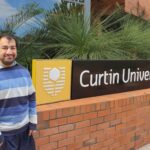Letting Aboriginal children use all their languages and dialects to make meaning could improve their engagement in the classroom and likelihood of future success, new research suggests.
Many Australian school children are multilingual – particularly Aboriginal children – yet the benefits of translanguaging to enhance communication and build knowledge is under-utilised by our education systems.
Translanguaging is the concurrent use of different languages together – not to be confused with ‘code-switching’, which is the wholesale shift between languages according to context, for example, when different languages are spoken at home and at school or work.
At Curtin’s School of Education, Professor Rhonda Oliver is researching the potential benefits of promoting the use of translanguaging by Aboriginal school children to enhance their communication skills.
“Many Aboriginal people grow up multilingual and can slide easily across several languages and dialects – including traditional languages, standard English, Aboriginal English and creoles, including one known as Kriol that’s used in the north of Australia,” Oliver explains.
“One reason is that in many traditional Aboriginal communities, parents often come from different language groups. A child would therefore access the two languages of their parents as well as the different languages of their grandparents.”
Her concern is that although the children have an impressive linguistic repertoire to draw upon, this is not well recognised in education.
Changing languages seamlessly
Supported by Australian Research Council funding, Oliver and her research partners at the University of Melbourne, Australian National University and the Batchelor Institute of Indigenous Tertiary Education have been recording the speech of Aboriginal children in regional and remote areas of Australia.
She provides a compelling reason to challenge the longstanding doctrine that in Australian classrooms children must only communicate in Standard Australian English.
“At a school we visited in central Australia, a young boy, about five years old, came up to me and asked, ‘What are you doing Miss?’. I explained why we were there, and he made a few relevant comments.
“Then the bell went and he turned to his friend and in Aboriginal English said, ‘Ay fella we bin outside now n play’. Then, as he was leaving he ran into his cousin and spoke to her in one of the traditional languages of their community.
“So in a space of a few minutes this child used three languages seamlessly. Each time the audience changed, he moved to another of his languages and did so appropriately.”
But despite the boy’s excellent linguistic skill, in a few years when he completes the national literacy test (NAPLAN), his results will almost certainly be lower than students who have English as their first language. It’s one indication that the system should be revising its literacy assessment protocols.
“The kids are coming to school with a traditional language or Aboriginal English as their first language, but they’re being tested in standard English – it’s an unfair playing field. And most testing doesn’t accommodate the diversity of cultural and linguistic background,” says Oliver.
“For example, in one NAPLAN test the students were asked to do a critical analysis of a movie poster. Students in very remote communities probably have never been to a cinema or seen a movie poster – it’s outside their world.
“Asking somebody to critique something they have no experience or knowledge of is prejudicial.”
Calling out linguistic racism
Just as unfair is the entrenched negative attitudes about Aboriginal English – a practice Oliver describes as ‘linguistic racism’. She references the views of well-known linguist Michael Clyne, who described Australia as having a ‘monolingual mindset’ that devalues languages other than English.
“I often asked Aboriginal students I met in different schools what language they speak, and many have replied with something like ‘I speak rubbish-talk, Miss’ when describing Aboriginal English,” Oliver explains.
“It’s a mindset that’s been passed down through several generations, but imagine growing up believing that your dominant language is rubbish.
“Yet, Aboriginal English is as grammatically complex as a standard English – it’s a dialect of English, in the same way that Scottish English is a dialect.”
She believes that instead of inhibiting the use of traditional languages and Aboriginal English in the classroom, teachers should encourage the children to use their full linguistic repertoire.
She points out the trend in tourism where people on country are guiding tourists out to traditional sites and explaining local traditions and foods, often communicating in traditional languages in combination with English.
“Tourists value this because it makes for a richer cultural experience.
“We need to adopt this approach more widely and create translanguaging spaces and encourage Aboriginal children to draw on all their languages and dialects to make meaning.
“So we’re studying the ways that Aboriginal children move fluidly between their languages to engage in interactive meaning-making processes. We’ll then be able to describe how teachers can incorporate translanguaging into their language pedagogy.”
Such a change in approach will enhance cultural safety and establish positive meanings about Aboriginality, and, in turn, may help to bridge the gap in education and employment outcomes.
“Acknowledging their linguistic diversity will enhance learning and reduce inequity. This will promote equality among these children – so it could be transformational across all areas of their lives.
“Of course the kids need to develop competency in standard English, but we need to value and use what they already have for teaching and learning purposes.”
Listen to Professor Oliver speak about the importance of translanguaging on our podcast, The Future Of:



